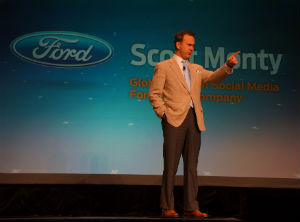 As marketers we all know that storytelling is an essential part of connecting with prospects and customers. Scott Monty (@scottmonty) and his team at Ford have taken the art of storytelling a step further.
As marketers we all know that storytelling is an essential part of connecting with prospects and customers. Scott Monty (@scottmonty) and his team at Ford have taken the art of storytelling a step further.
In his moving (yes I said moving) keynote, Scott walked the audience through some of Ford’s most recent and innovative campaigns. In many of these campaigns the story is told not from the perspective of Ford, but from that of the consumer. Below you’ll find more about the stories of these campaigns, the people who told them, and the lessons learned.
Let Your Customers Tell The Story
The Car: Ford Fiesta
The Buyer: Millennium’s
The Story: In an attempt to make an impact on the small car market, Ford began manufacturing the Fiesta. In order to sell this affordable automobile, Ford needed to connect with millennium buyers. Buyers that most likely didn’t know, or didn’t care about Ford.
To discover how to best market the Fiesta to millennium’s Ford had to take a close look at what mattered most to their target buyer. This buyer was interested in co-creating content and participating in real-time engagement. If Fords message was going to hold credibility, the buyer needed to help tell the story.
To connect with buyers Ford ended up giving 100 cars to 100 individuals around the US for six months and all they had to do was create 1 video a month about the Fiesta. Since this buyer group was already spending time on the social web creating content was already a part of their existing lifestyle.
Lesson Learned: If you don’t have a good product it will show. If you have a good product, let go of your fear and let others tell your story
Re-Launching A Product Is Risky Business
When Ford decided to re-launch the Explorer they wanted to get consumers excited about the new features offered by the updated SUV. So, Ford went directly to the consumer and brought them along for the journey.
In fact, Ford even designated July 26th as “Explorer Day” and built up a lot of excitement around a series of live events in different cities throughout the U.S. on the same day. During the same time Ford had a variety of content types that customers could chose to interact with, on their own schedule.
Additionally, Ford used paid media to purchase real estate on high traffic sites like CNN.com to draw even more consumers to their website. When users clicked on the content they were shown information on the vehicle as well as interactions on the company Facebook page.
Lesson Learned: The complete integration of earned, owned, and paid media can have a significant impact.
Twentysomethings Love To Be Entertained
The Car: Ford Focus
The Buyer: Male, mid to late 20’s
The Story: The Ford Focus introduced a new sleeker design and needed to find a way to market it to young adults. The target demographic spends time watching comedy shows like Chappelle Show, Tosh.O, and South Park – It’s clear they like to laugh and be entertained.
Ford launched a campaign featuring a less than lovable orange puppet named Doug. Doug had a habit of getting himself into sticky situations, in a way that was absolutely hilarious. Below is my personal favorite Doug video:
Lesson Learned: If you want to connect with customers you need to speak their language.
Take Engagement One Step Further
When marketing the Escape, Ford went so far as to create a web series called “Escape My Life!”. The series focused on a wardrobe designer named Skylar that found herself in serious need of new transportation. In a nutshell, the show was a hit! You can watch Episode 1 below:
Ford to chose to take the personalities within the show a step further by creating a Tumblr blog for Barry (or Sensei) in which he serves up truths about life, love, zombies, gluten, and of course the new Ford Escape. Telling the back story of a character like Barry drew audience members in even further.
Lesson Learned: Embrace the platforms that your audience uses.
Believe it or not, the stories above are just a few of the examples that Scott shared in his keynote which closed out day one of NMX Las Vegas. If we as marketers can tap into even just a little bit of the awesome that Ford does we’ll be well on our way to better connecting with our prospects and customers. Scott left the audience with two final pieces of advice, both of which are essential to success:
- We need to eat our own dog food. Meaning we need to execute on the advice that we give.
- In the end we want to do things that benefit all of us and make us all look good. We want to give people some sort of value return by listening.
BONUS!
[From Lee] I caught up with Scott before giving his keynote for a quick interview about his presentation topic and how storytelling and social media align with Ford’s customer relationships. You can view the video below, which is much better than the video interview I did with him in 2008 atop a Maker’s Mark RV and the one we did at Ford Global Headquarters in 2010.
One of the key messages of Scott’s presentation at NMX came through this quote: “If you have a good product, let go of your fear & let customers tell your story.” Social media and content provide incredible opportunities for brands and their customers to evolve the relationship in new ways that serve the interests of the community, customers and the brand. A win all around.
Find out more about Ford’s community and customer stories at: social.ford.com


